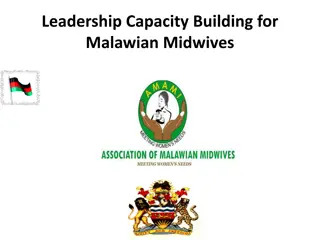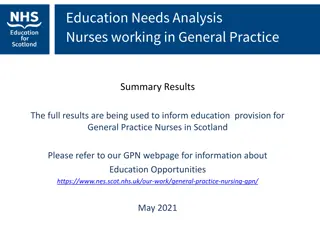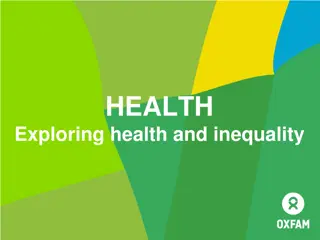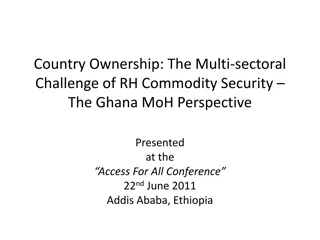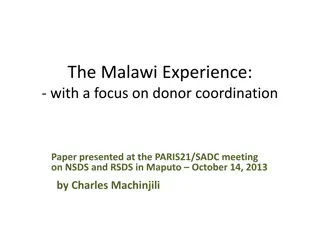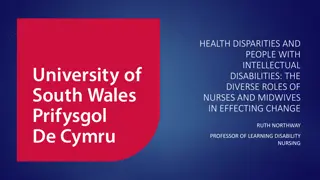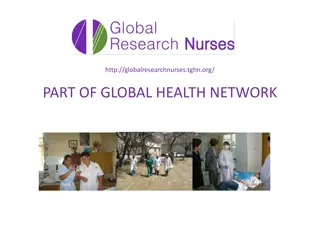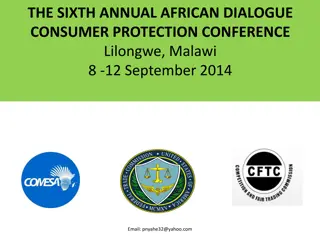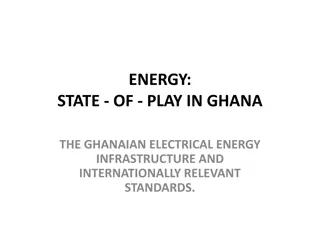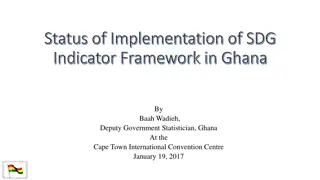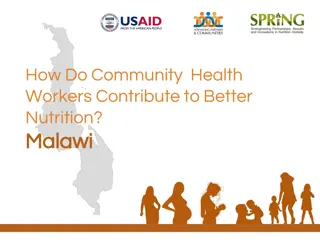Enhancing Pre-Service Nutrition Education for Nurses and Midwives in Ghana and Malawi
This project led by Alice Nkoroi focused on improving access and quality of nutrition services in Ghana and Malawi by enhancing pre-service nutrition education for frontline workers like nurses and midwives. The approach involved stakeholder consultation, defining core nutrition competencies, and conducting a situational analysis to align teaching practices with national nutrition policy priorities. The impact of this initiative includes strengthening the competence of healthcare providers in delivering crucial nutrition services.
Download Presentation

Please find below an Image/Link to download the presentation.
The content on the website is provided AS IS for your information and personal use only. It may not be sold, licensed, or shared on other websites without obtaining consent from the author. Download presentation by click this link. If you encounter any issues during the download, it is possible that the publisher has removed the file from their server.
E N D
Presentation Transcript
Alice Nkoroi BSc, MS Country Project Manager Food and Nutrition Technical Assistance III Project (FANTA)/ FHI 360, Ghana (2009 2013) and Malawi (2014 2017)
Improving Pre-service Nutrition Education of Frontline Workers: Nurses and Midwives in Ghana and Malawi Alice Nkoroi, FANTA/FHI 360
Presentation Outline 1. Context 2. Approach and Process 3. Impact 4. Lessons Learned 5. Acknowledgments
1. Context In both Ghana and Malawi, FANTA worked to improve access and quality of nutrition services. This included support to the governments to develop policies, strategies and guidelines; and build competence of health care providers and managers. Lancet Series (2013) emphasis on capacity development of variety of human resource needed to scale-up priority nutrition interventions. With the limited number of nutritionist and dieticians working at the forefront, nurses and midwives play a vital role in delivering nutrition services. WHO and International council of nurses highlight on the need for competence based pre-service nutrition education.
Plan and Define the Scope (2) Stakeholder Consultation and Consensus With the MOH, teaching institutions, regulatory bodies and nutrition partners National Guidelines and Policy Priorities Update and alignment with national context, global guidance and standards Define the Core Nutrition Competencies What should a nurse or midwife know and be able to do in nutrition
Conduct Situational Analysis (2) Assessment of Teaching and Resources Curricula Review and Mapping What is the trainers (lecturers/tutors) level of competence on nutrition? What nutrition content is taught? Do the trainers have access to up-to-date teaching resources? Are the core competencies and national nutrition policy priorities taught? Do the schools have nutrition equipment and tools?
Example from Ghana: Assessment of Tutors Competence in Nutrition (2) Average Score (%) Classification Knowledge of: Prevention of micronutrient deficiencies 71% Good Nutrition assessment (anthropometry and clinical) 64% Average Complementary feeding 52% Average Basic nutrition 45% Average Breastfeeding and lactation management 22% Poor Maternal nutrition Inpatient care management of severe acute malnutrition with medical complications Outpatient care management of severe acute malnutrition without medical complications Skills in: 11% Poor 7% Poor 0% Poor Nutrition assessment 20% Poor Nutrition counseling on infant and young child feeding 3% Poor
Intervene (2) Train the Trainer (i.e., Lecturers/ Tutors) Standardized Teaching Aids and Resources Equip Institution to Facilitate Practice Post- Training Support to the institutions Update Training Curricula (or document for future updates)
Example from Malawi: Standardized Nutrition Teaching Aids and Resources for Nursing and Midwifery Institutions
Review and Evaluate the Interventions (2) Curricula and resources Post- Trainer competence Intervention Evaluation Students competence Teaching and curricula Refine the Scope based on Evaluation Findings Resources and materials
3. Impact The core competencies requirements for service delivery were aligned with pre-service training and job descriptions. Curricula for nurses and midwives included nutrition clinical practice sessions that were previously not covered. Pre-service training on nutrition was standardized and evidence based. Tutors had a solid understanding of and skills in teaching nutrition theory and practice.
4. Lessons Learned Defining core competencies provided scope for including the national policy priorities in the pre-service training curricula. Updating pre-service training should be continuous process. This should be done alongside continuous professional development while in-service. For sustainability of interventions, partnerships and collaboration should include the MOH at all levels, teaching institutions and the regulatory bodies. More online training and resources are needed to help mitigate problems related the teacher-student ratio and time needed to cover the course material.
This presentation is made possible by the generous support of the American people through the support of the Office of Maternal and Child Health and Nutrition, Bureau for Global Health, U.S. Agency for International Development (USAID), under terms of Cooperative Agreement No. AID-OAA-A-12- 00005, through the Food and Nutrition Technical Assistance III Project (FANTA), managed by FHI 360. The contents are the responsibility of FHI 360 and do not necessarily reflect the views of USAID or the United States Government.






